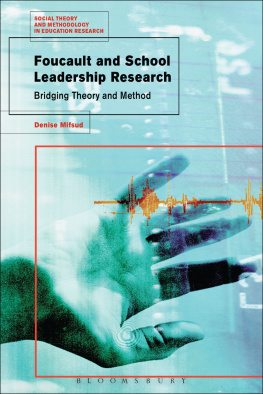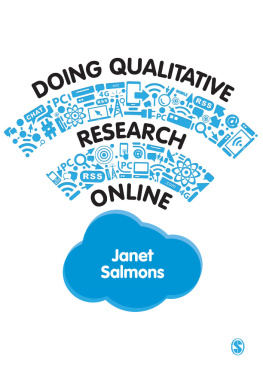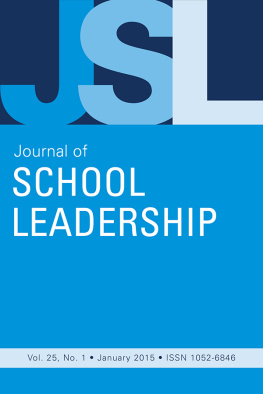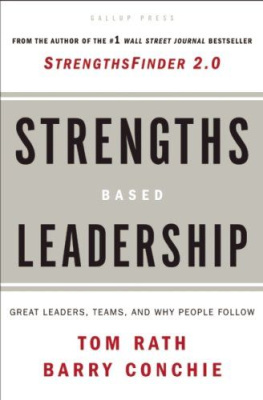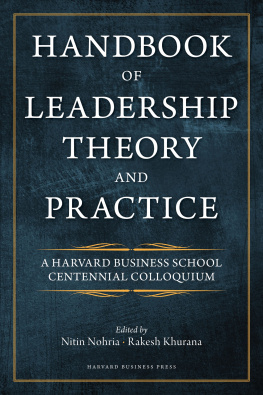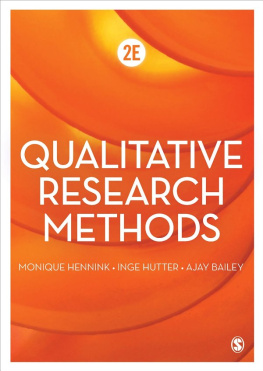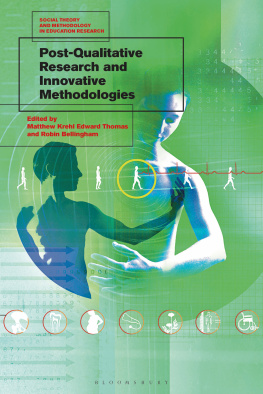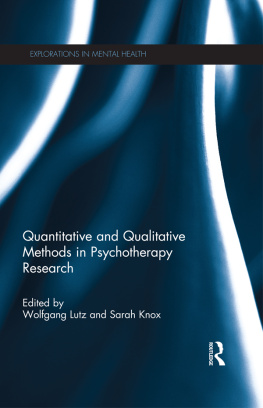Foucault and School Leadership Research
Social Theory and Methodology in Education Research series
Edited by Mark Murphy
The Bloomsbury Social Theory and Methodology in Education Research series brings together books exploring various applications of social theory in educational research design. Each book provides a detailed account of how theory and method influence each other in specific educational research settings, such as schools, early childhood education, community education, further education colleges and universities. Books in the series represent the richness of topics explored in theory-driven education research, including leadership and governance, equity, teacher education, assessment, curriculum and policy studies. This innovative series provides a timely platform for highlighting the wealth of international work carried out in the field of social theory and education research, a field that has grown considerably in recent years and has made the likes of Pierre Bourdieu and Michel Foucault familiar names in educational discourse. Books in the Social Theory and Methodology in Education Research series offer an excellent resource for those who wish to use theoretical concepts in their research but are not sure how to do so, and who want to better understand how theory can be effectively applied in research contexts, in practically realizable ways.
Also available from Bloomsbury
Philosophy of Educational Research , Richard Pring
Forthcoming from Bloomsbury
Generative Social Research in Education , Anthony Barnett
Thinking in Education Research , Nick Peim
Foucault and School Leadership Research
Bridging Theory and Method
Denise Mifsud
Bloomsbury Academic
An imprint of Bloomsbury Publishing Plc

Contents
To Joseph, my lifetime companion, who has had to share my attention ever since I encountered the work of the French philosopher Michel Foucault, while being subjected to my endless ramblings in my dire attempts at bridging theory and data, of which this book is a product. My parents and brother also provided an unending source of support and constant encouragement.
I am also eternally grateful to Miss Perfection who invited me to Sunnyside College and to all the Heads who welcomed me into their network my research story would have never unfolded without them.
I would also like to thank Mark Murphy who invited me to publish the first book in the series I am honoured to have been given this opportunity.
I would like to thank Cate Watson for introducing me to narrative and irony.
Education research has a long history of adapting ideas from social theory. While this has always been the case when it comes to educational foundations, in recent years there has been an enormous growth in the adoption of social theory in the field of educational research. The names of theorists such as Pierre Bourdieu, Jrgen Habermas, Judith Butler and Michel Foucault have become commonplace in the field, making social theory increasingly familiar to those who both conduct education research and utilize it in their teaching.
As its familiarity increases, so too does the desire to engage with social theory in more thoughtful and effective ways. There is currently a strong desire for applying social theory in educational research contexts, which makes sense, as without theory, much education research can be overly descriptive and/or restricted by narrow definitions of professional practice. Social theory can assist in efforts to transcend the everyday taken-for-granted understandings of education, while also reflecting erstwhile concerns in education around power, control, social justice and transformation.
The issue then becomes one of applying theory to method, with the focus shifting to a growing interest in the art of application itself. This interest comes with a set of key questions attached:
- How best to apply concepts such as habitus, subjectivation and performativity in educational research contexts?
- What are the ways in which methodological concerns meet theoretical ones?
- In what ways does social theory shape the quality of research outcomes?
These questions require thoughtful responses, and the purpose of this book series is to help provide solutions to these issues, while also helping to develop the capacity, in particular of postgraduate and early career researchers, to successfully put social theory to work in research. This is especially important as theory application in method is a challenging and daunting enterprise. The set of theories developed by the likes of Foucault, Jacques Derrida, Bourdieu et al. could never be described as simple or easy to navigate. On top of that there are a variety of issues faced when applying such ideas in research contexts, a field of complex interwoven imperatives and practices in their own right. These challenges epistemological, operational, analytical inevitably impact on researchers and our attempts to make sense of research questions, whether these be questions of governance and political regulation, social reproduction, power, cultural or professional identities (among others). So care needs to be taken when applying a challenging set of ideas onto a challenging set of practices, incorporating a strong consideration for both intellectual arguments alongside the concerns of the professional researcher.
The series should hold a strong appeal to the growing numbers of researchers who are keen to apply social theory in their research, as evidenced by the growing audience for the editors own website http://www.socialtheoryapplied.com . It will offer an excellent resource for those who wish to use theoretical concepts in their research but are not sure how to do so, and will also appeal to readers who have a strong interest in better understanding how theory can be effectively applied in research contexts, in practically realizable ways.
In terms of output, this series is designed to provide a collection of books exploring various applications of social theory in educational research design. Each book will provide a detailed account of how theory and method influence each other in specific educational research settings, such as schools, early years, community education, further education colleges and universities. The series will represent the richness of topics explored in theory-driven education research, including leadership and governance, equity, teacher education, assessment, curriculum and policy studies. It will also provide a timely platform for highlighting the wealth of work done in the field of social theory and education research, a field that has grown considerably in recent years and has made the likes of Pierre Bourdieu and Michel Foucault familiar names in educational discourse.
Embedded in the design of the series is a strong pedagogical component with a focus on the how of applying theory in methods and an emphasis on operationalizing theory in research. This pedagogical remit will be addressed explicitly in the texts in different ways the responsibility of addressing this will fall to the authors and editors, but can take the form of case studies, learning activities, focus sections and glossaries detailing the key theoretical concepts utilized in the research.
Foucault and School Leadership Research , written by Denise Mifsud, is the first book to be published as part of the series, and serves as an embodiment of all the series aims to achieve. It illustrates the application of Foucauldian theory to an educational leadership research context and, in doing so, describes the ways the author negotiated the methodological tensions present in the conduct of qualitative educational inquiry. The book is based on an empirical study of a multisite school collaborative in Malta, which investigated relations of power within the unfolding network among the various leadership hierarchies in school governance. Mifsud uses the medium of drama to present her research findings so as to show rather than just tell readers about network leadership dynamics. This innovative use of dramatization to communicate her findings and analysis serves to problematize the representation of qualitative educational research, and also helps to illuminate the significance of theory in methodological design. This is done alongside and in tandem with the application of core ideas adapted from Michel Foucault, such as webs of power, discipline, governmentality, discourse and subjectification. Using such ideas, Mifsud delivers a cogent and forceful critique of traditional understandings of educational leadership.

